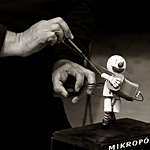Director, writer, performer and puppet maker Eric Bass offers a beautiful essay on what it means (and doesn’t mean) to be a puppet performer. And his points resonate rather deeply with what it means to work expressively in the world. He disputes two myths about puppet performance: That the puppeteer controls the puppet, and that the puppeteer manipulates the puppet with his or her hands. He offers, instead, an artful way for any of us to approach our creative work. Says he:
As puppeteers, it is, surprisingly, not our job to impose our intent on the puppet. It is our job to discover what the puppet can do and what it seems to want to do. It has propensities. We want to find out what they are, and support them. We are, in this sense, less like tyrants, and more like nurses to these objects. How can we help them? They are built for a purpose. They seem to have destinies. We want to help them arrive at those destinies.
He goes on to discuss how puppeteers perform not with their hands, but through their hands, from their breath, and out into the world. Their path to artistry and connection is not through control and command, but rather through discovery and humility. Again says he:
Our first act of generosity is to let the piece be about the puppet, not about us. Our second act of generosity is to let the piece be about a greater world outside the puppet. This is where our breath and the breath of the audience meet to make meaningful theater.
The piece made me wonder about a similar approach to working through an organization, its people, its resources, and its community — not by making or building or manipulating the enterprise, but by finding the purpose that is already within it, and helping it breathe into the world.



What a fabulous way of experiencing life. Definitely a perspective I need just now.
Some good stuff on the topic in this Radiolab episode: http://www.radiolab.org/story/117294-me-myself-and-muse/